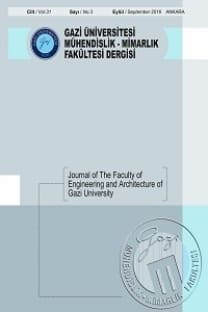VİTES GEÇİŞLERİNE GÖRE YAKIT TÜKETİMİNİN MODELLENMESİ: VİTES DEĞİŞTİRME STRATEJİLERİNİN YAKIT TÜKETİMİNE ETKİLERİNİN ANALİZİ
Modelleme, yakıt, tüketim, vites değiştirme, strateji
___
- Ben-Chaim, M.,Shmerling, E., Kuperman, A., Analytic Modeling of Vehicle Fuel Consumption, Energies, 6, 117-127, 2013.
- Chaim, M.B.,Smerling, E., Modeling vehicle fuel consumption at urban operating conditions, International Journal of Mechanics, 7(1), 18-25, 2013.
- Faris, W.,Rakha, H., Elmoselhy, S., Impact of Intelligent Transportation Systems on Vehicle Fuel Consumption and Emission Modeling: An Overview, SAE Int. J. Mater. Manf., 7(1), 129-146, 2014.
- Yue H., Mesoscopic Fuel Consumption and Emission Modeling, Doctor of Philosophy Dissertation, Virginia Polytechnic Institute and State University, 2008.
- Chang M., Evans L., Trip time versus stop time and fuel consumption characteristics in cities, Transportation Science, 15, 183-209, 1981.
- Evans L., Herman R., Automobile fuel economy on fixed urban driving schedules, Transportation Science, 12(2), 137-152, 1978.
- Biggs, D.G., Akçelik, R.,Models for Estimation of Car Fuel Consumption in Urban Trafic, ITE Journal, 29-32, 1986.
- Post, K., Kent, J.H., Tomlin, J., Carruthers, N., Fuel consumption and emission modelling by power demand and a comparison with other models, Transportation Research Part A: General, 18(3), 191-213, 1984.
- An, F.,ve M. Ross, Model of Fuel Economy with applications to Driving Cycles & Traffic Management, Transportation Research Record, Washington, D.C, 1993.
- Anh, K., Microscopic Fuel Consumption and Emission Modeling, Master of Science Thesis, Faculty of the Virginia Polytechnic Institute and StateUniversity, Blacksburg, Virginia, 1998.
- Oh, Y., Park, J.,Lee, J.,Eom, M.D.,Park, S., Modeling effects of vehicle specifications on fuel economy based on engine fuel consumption map and vehicle Dynamics, Transport Research PartD:Transport Environmental 32, 287–302,2014.
- Burgess, S.C. ve Choi J.M.J., A parametric study of the energy demands of car transportation: a case study of two competing commuter routes in the UK, Transport Research Part D:Transport Environmental, 8, 21–36, 2003.
- Ehsani, M., Ahmadi, A., Fadai, D., Modeling of vehicle fuel consumption and carbondioxide emission in road transport Letter to the Editor, Renewable and Sustainable Energy Reviews, 53, 1638–1648, 2016.
- Guzzella, L. ve Sciarretta, A., Vehicle propulsion systems ıntroduction to modeling and optimization, Springer, 2011.
- Lee, M.G., Park, Y.K., Jung, K.K., Yoo, J.J., Estimation of Fuel Consumption using In-Vehicle Parameters, International Journal of Service, Science and Technology, 4(4), 2011.
- Naunheimer, H.,Bertsche, B., Ryborz, J., Novak, W., AutomotiveTransmissions Fundamentals, Selection, Design and Application, Second Edition, Springer-Verlag, 2011.
- Ivarsson, M., Fuel Optimal Powertrain Control for Heavy Trucks Utilizing Look Ahead, Master of Science Thesis, Stockholm, Linköping Studies in Science and Technology, Thesis No. 1400, 2009.
- Casavola,A., Prodi, G., Rocca, G., Efficient Gear Shifting Strategies for Green Driving Policies, American Control Conference, Marriott Waterfront, Baltimore, MD, USA, June 30-July 02, 2010.
- Ngo, V.D., Navarrete, J.A.C., Hofman, T., Steinbuch, M., Serrarens,A., Optimal gear shift strategies for fuel economy and driveability, Proc IMechE Part D: J Automobile Engineering, 227(10), 1398–1413, 2013.
- Mashadi, B., Amiri-rad, Y., Afkar, A., Mahmoodi-Kaleybar, M.,Simulation of automobile fuel consumption and emissions for various driver’s manual shifting habits, J. Cent. South Univ., 21, 1058−1066, 2014.
- Mashadi, B. ve Lakeh, R.B., Fuel economy improvement based on a many-gear shifting Strategy, International journal of energy and environment, 3(4), 577-590, 2012.
- Blagojevıc, I.A.,Vorotovic, G.S., Ivanovic, G.S., Jankovic, S.P., Popovic,V.M., Energy Efficiency Improvement by Gear Shifting optimization, Thermal Science, 17(1), 91-105, 2013.
- Eckert, J.J., Santiciolli, F.M., Costa, E. D.S., Alkmin E Silva, L.C.D., Dionisio, H.J., Correa F.C., Dedini F. G., Fuel Consumption Reduction Based on the Optimization of the Vehicle Gear Shifting Strategy Considering New Gear Ratios, SAE Congresso Brasil, 2015-36-0136, 2015.
- Moskalik, A., Hula, A., Barba, D., and Kargul, J., Investigating the Effect of Advanced Automatic Transmissions on Fuel Consumption Using Vehicle Testing and Modeling, SAE Int. J. Engines, 9(3), 2016.
- Ünlüsoy, Y.S., Performance of Road Vehicles, ODTÜ, Ankara, 2004.
- Mashadi, B. ve Crolla, D., Vehicle powertrain systems, WILEY, 2010.
- Pulkrabek, W.W., Engineering Fundamentals of the Internal Combustion Engine, Prentice Hall, New Jersey, 2003.
- Vantsevich, V.V.,Joshi, B.H., Bortolin, G., Transmission Gear Ratio vs Fuel Consumption: Retrospective Analysis for Future Terrain Vehicle Applications, ASME 2012 International Design Engineering Technical Conferences and Computers and Information in Engineering Conference, 533-553, Chicago, Illinois, USA, 2012.
- Rutten, J,H., Design of a New Transmission Concept, Master of Science Thesis, Stuttgart, Eindhoven University of Technology, Thesis No. DCT 2005.56.
- Genta, G., Motor Vehicle Dynamics: Modeling and Simulation, World Scientific, Singapore, 2006.
- Wong, J.Y., Theory of Ground Vehicles - Second Edition, WILEY, New York, 1993.
- Gołębiewski, W., ve Stoeck, T., Relationships Between Vehicle Traction Properties and Fuel Consumption for Total Engine Load, Teka. Commission of Motorizatıon and Energetics in Agriculture, 15 (1), 15–18, 2015.
- Wu, W. ve Ross, M., Spark-Ignition Engine Fuel Consumption Modeling, SAE International Congress and Exposition, Detroit, Michigan, 1999.
- Faris, W., Rakha, H., and Elmoselhy, S., Analytical Modelling of Diesel Powertrain Fuel System and Consumption Rate, SAE Int. J. Mater. Manf., 8(1), 2015.
- Berry, I,M., The Effects of Driving Style and Vehicle Performance on the Real-World Fuel Consumption of U.S. Light-Duty Vehicles, Master of Science Thesis, Massachusetts Institute of Technology, February, 2010.
- ISSN: 1300-1884
- Yayın Aralığı: Yılda 4 Sayı
- Başlangıç: 1986
- Yayıncı: Oğuzhan YILMAZ
GÖRÜNTÜ İŞLEME TEMELLİ HIZLI ÜST EKSTREMİTE DEĞERLENDİRME YÖNTEMİ
Gülin Feryal CAN, Nilgün FIĞLALI
frezeyle tornalamada takımda ortaya çıkan termal deformasyonların modellenmesi
Umut KARAGÜZEL, Mustafa BAKKAL, Erhan BUDAK
ATIK MİNERAL YAĞ İLE KİRLENMİŞ TOPRAKLARDA ORGANİK AZOT FRAKSİYONLARININ BELİRLENMESİ
Efsun DİNDAR, Neşe ŞEN CİHAN, Fatma Olcay TOPAÇ ŞAĞBAN, Hüseyin Savaş BAŞKAYA
TANYERİ BARAJI ÖRNEĞİNDE BARAJLARIN TAŞKIN NEDENİYLE ÜSTTEN AŞILMA GÜVENİLİRLİĞİNİN BELİRLENMESİ
Atık mineral yağ ile kirlenmiş topraklarda organik azot fraksiyonlarının belirlenmesi
Efsun DİNDAR, Neşe CİHAN, Fatma Olcay TOPAÇ ŞAĞBAN, Hüseyin SAVAŞ BAŞKAYA
ÇOK AMAÇLI TEK SIRA TESİS DÜZENLEME PROBLEMİNİN ÇÖZÜMÜ İÇİN NSGA-II VE HEDEF PROGRAMLAMA YAKLAŞIMI
Esra Duygu DURMAZ, Ramazan ŞAHİN
İzmir ve Çevresinin 3-B Kabuk Hız Yapısı
Manyetik parçacık görüntüleme için sinyal-gürültü oranını eniyileyen görüntü geriçatım tekniği
Ecem BOZKURT, Emine Ülkü SARITAŞ
Tekil Değer Ayrışımı Tabanlı Yeni Bir İmge Kimliklendirme Yöntemi
